American Government: Pre-Clearance Power in Election Laws Debate
VerifiedAdded on 2022/09/05
|5
|1115
|16
Essay
AI Summary
This essay delves into the pre-clearance provisions of the Voting Rights Act of 1965, focusing on the debate surrounding federal oversight of election laws. It begins by describing the pre-clearance requirements, which mandated that certain jurisdictions obtain federal approval before implementing changes to their election procedures. The paper then compares and contrasts the perspectives of those who support federal pre-clearance, arguing for its role in preventing voter suppression, with those who oppose it, emphasizing states' rights and concerns about federal overreach. Drawing on evidence from elections after the Shelby County v. Holder (2013) Supreme Court decision, which weakened pre-clearance, the essay argues whether federal pre-clearance should be restored, considering the potential impact on voting rights and the integrity of the electoral process. The author concludes that the pre-clearance process is essential to ensure fair elections.
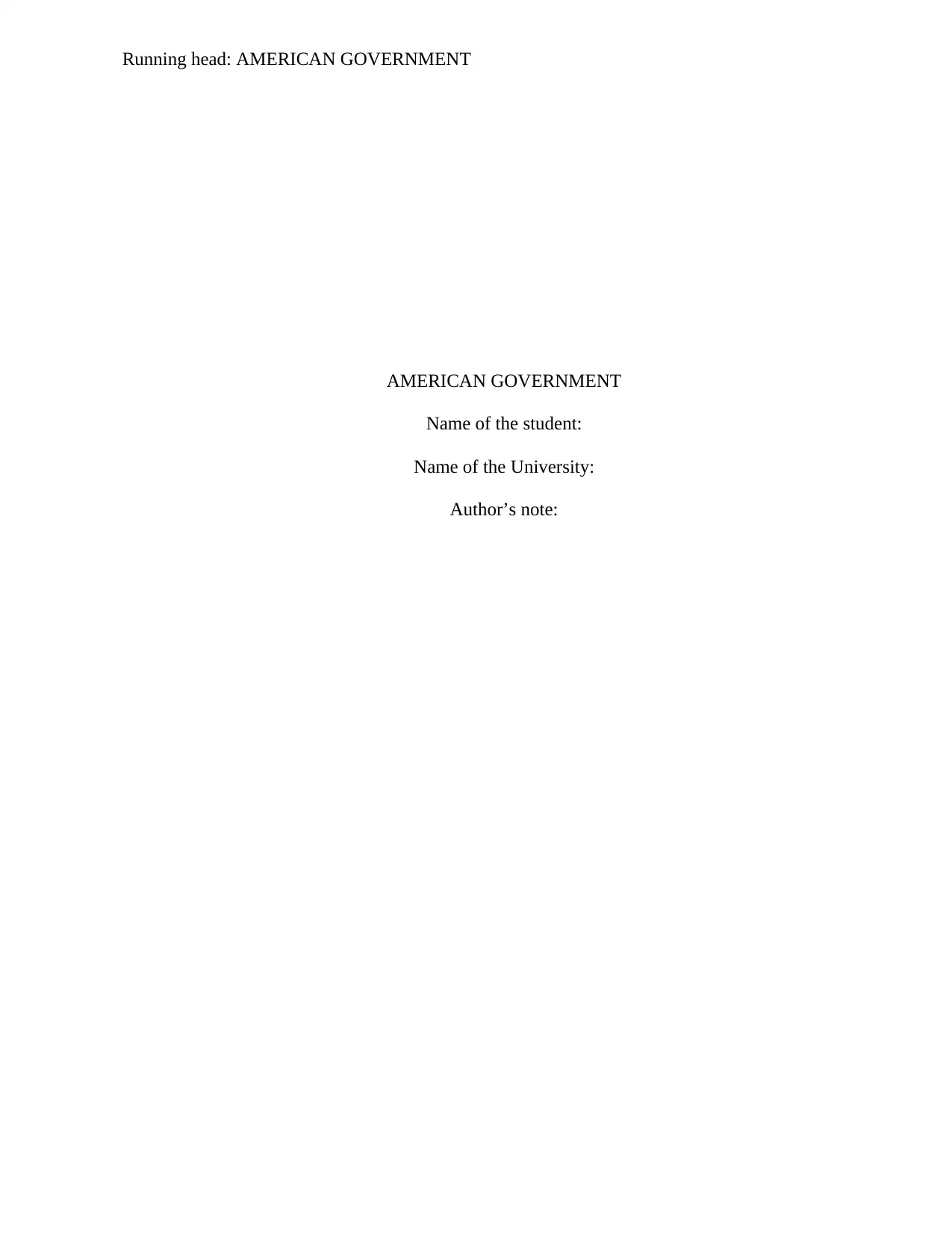
Running head: AMERICAN GOVERNMENT
0
AMERICAN GOVERNMENT
Name of the student:
Name of the University:
Author’s note:
0
AMERICAN GOVERNMENT
Name of the student:
Name of the University:
Author’s note:
Paraphrase This Document
Need a fresh take? Get an instant paraphrase of this document with our AI Paraphraser
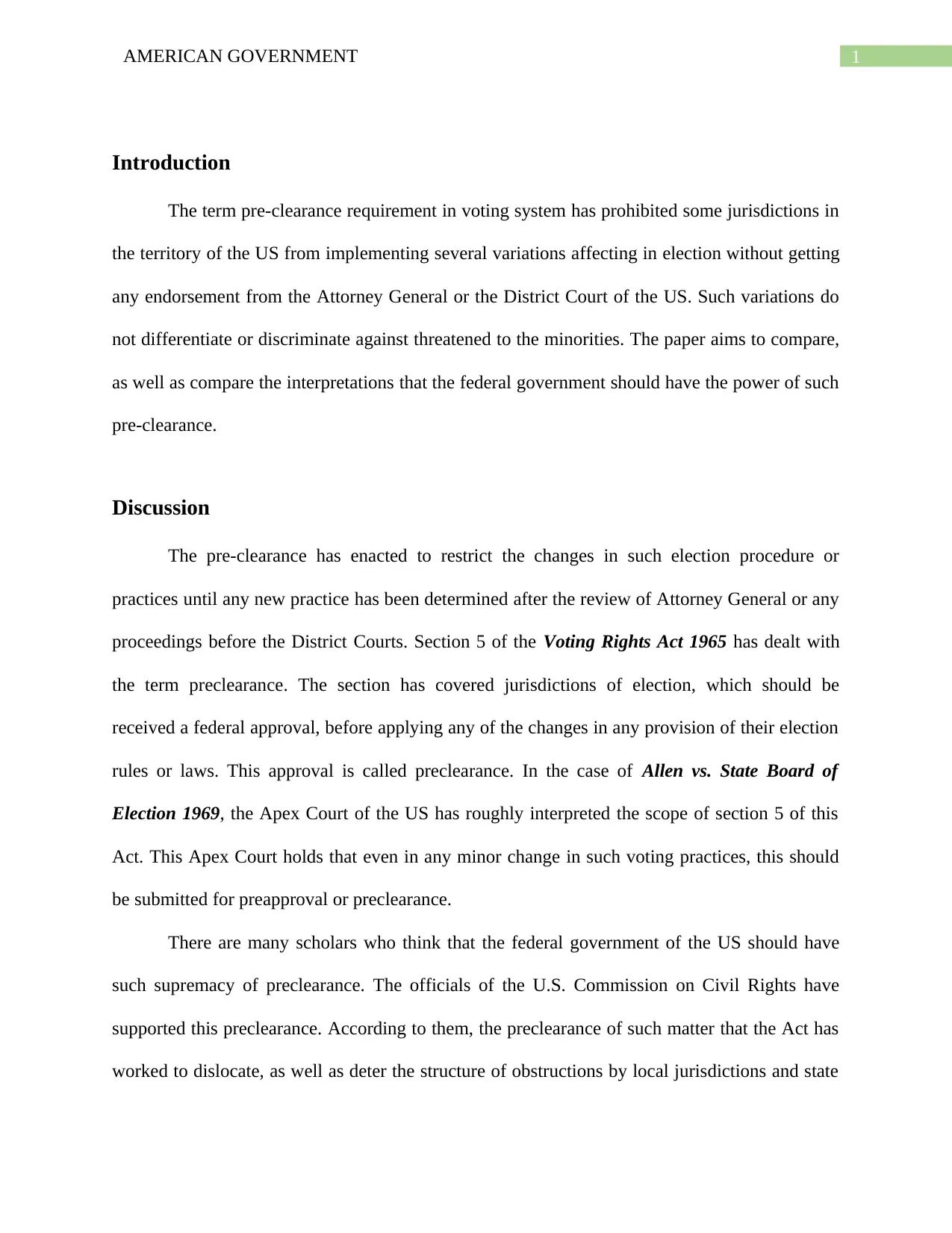
1AMERICAN GOVERNMENT
Introduction
The term pre-clearance requirement in voting system has prohibited some jurisdictions in
the territory of the US from implementing several variations affecting in election without getting
any endorsement from the Attorney General or the District Court of the US. Such variations do
not differentiate or discriminate against threatened to the minorities. The paper aims to compare,
as well as compare the interpretations that the federal government should have the power of such
pre-clearance.
Discussion
The pre-clearance has enacted to restrict the changes in such election procedure or
practices until any new practice has been determined after the review of Attorney General or any
proceedings before the District Courts. Section 5 of the Voting Rights Act 1965 has dealt with
the term preclearance. The section has covered jurisdictions of election, which should be
received a federal approval, before applying any of the changes in any provision of their election
rules or laws. This approval is called preclearance. In the case of Allen vs. State Board of
Election 1969, the Apex Court of the US has roughly interpreted the scope of section 5 of this
Act. This Apex Court holds that even in any minor change in such voting practices, this should
be submitted for preapproval or preclearance.
There are many scholars who think that the federal government of the US should have
such supremacy of preclearance. The officials of the U.S. Commission on Civil Rights have
supported this preclearance. According to them, the preclearance of such matter that the Act has
worked to dislocate, as well as deter the structure of obstructions by local jurisdictions and state
Introduction
The term pre-clearance requirement in voting system has prohibited some jurisdictions in
the territory of the US from implementing several variations affecting in election without getting
any endorsement from the Attorney General or the District Court of the US. Such variations do
not differentiate or discriminate against threatened to the minorities. The paper aims to compare,
as well as compare the interpretations that the federal government should have the power of such
pre-clearance.
Discussion
The pre-clearance has enacted to restrict the changes in such election procedure or
practices until any new practice has been determined after the review of Attorney General or any
proceedings before the District Courts. Section 5 of the Voting Rights Act 1965 has dealt with
the term preclearance. The section has covered jurisdictions of election, which should be
received a federal approval, before applying any of the changes in any provision of their election
rules or laws. This approval is called preclearance. In the case of Allen vs. State Board of
Election 1969, the Apex Court of the US has roughly interpreted the scope of section 5 of this
Act. This Apex Court holds that even in any minor change in such voting practices, this should
be submitted for preapproval or preclearance.
There are many scholars who think that the federal government of the US should have
such supremacy of preclearance. The officials of the U.S. Commission on Civil Rights have
supported this preclearance. According to them, the preclearance of such matter that the Act has
worked to dislocate, as well as deter the structure of obstructions by local jurisdictions and state
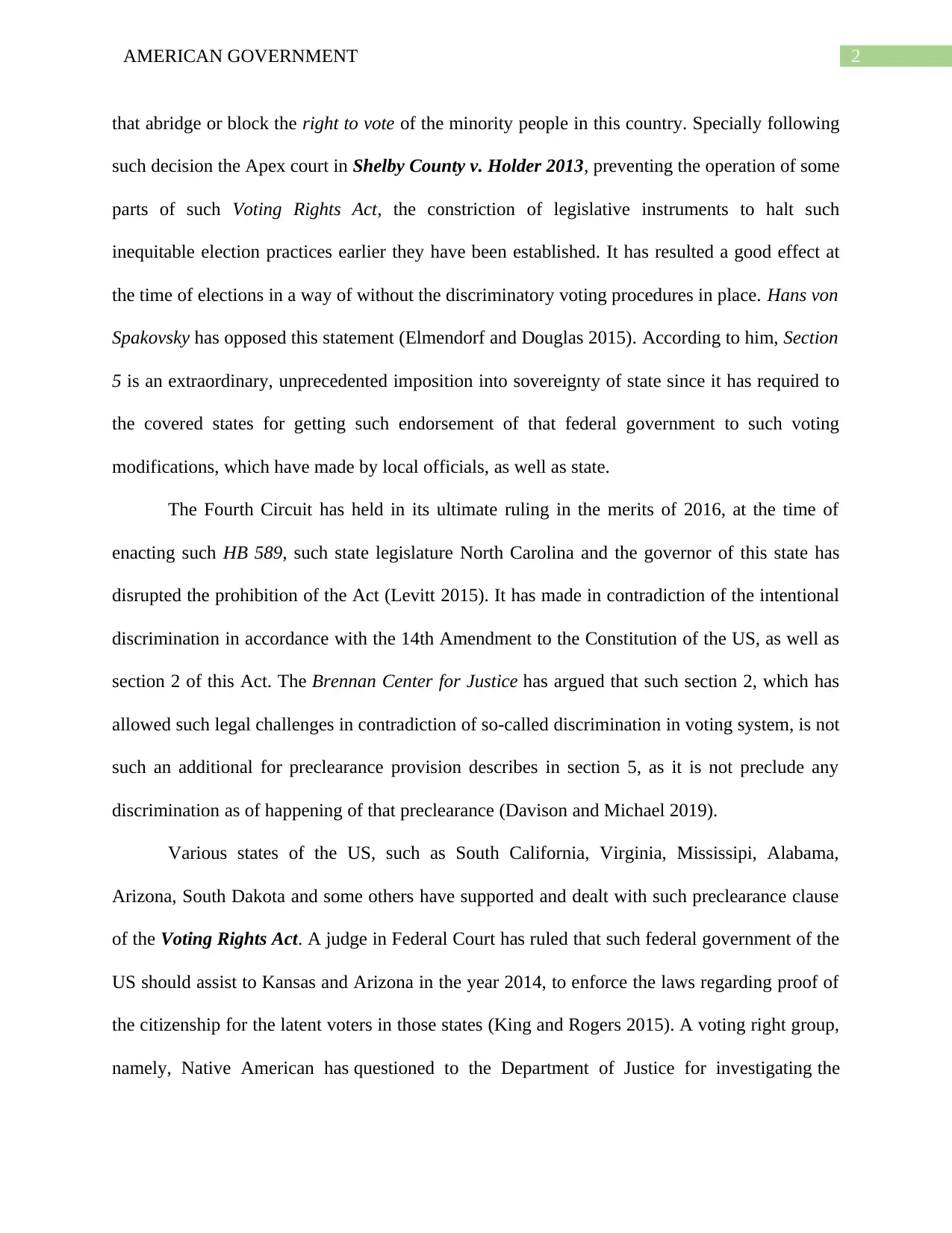
2AMERICAN GOVERNMENT
that abridge or block the right to vote of the minority people in this country. Specially following
such decision the Apex court in Shelby County v. Holder 2013, preventing the operation of some
parts of such Voting Rights Act, the constriction of legislative instruments to halt such
inequitable election practices earlier they have been established. It has resulted a good effect at
the time of elections in a way of without the discriminatory voting procedures in place. Hans von
Spakovsky has opposed this statement (Elmendorf and Douglas 2015). According to him, Section
5 is an extraordinary, unprecedented imposition into sovereignty of state since it has required to
the covered states for getting such endorsement of that federal government to such voting
modifications, which have made by local officials, as well as state.
The Fourth Circuit has held in its ultimate ruling in the merits of 2016, at the time of
enacting such HB 589, such state legislature North Carolina and the governor of this state has
disrupted the prohibition of the Act (Levitt 2015). It has made in contradiction of the intentional
discrimination in accordance with the 14th Amendment to the Constitution of the US, as well as
section 2 of this Act. The Brennan Center for Justice has argued that such section 2, which has
allowed such legal challenges in contradiction of so-called discrimination in voting system, is not
such an additional for preclearance provision describes in section 5, as it is not preclude any
discrimination as of happening of that preclearance (Davison and Michael 2019).
Various states of the US, such as South California, Virginia, Mississipi, Alabama,
Arizona, South Dakota and some others have supported and dealt with such preclearance clause
of the Voting Rights Act. A judge in Federal Court has ruled that such federal government of the
US should assist to Kansas and Arizona in the year 2014, to enforce the laws regarding proof of
the citizenship for the latent voters in those states (King and Rogers 2015). A voting right group,
namely, Native American has questioned to the Department of Justice for investigating the
that abridge or block the right to vote of the minority people in this country. Specially following
such decision the Apex court in Shelby County v. Holder 2013, preventing the operation of some
parts of such Voting Rights Act, the constriction of legislative instruments to halt such
inequitable election practices earlier they have been established. It has resulted a good effect at
the time of elections in a way of without the discriminatory voting procedures in place. Hans von
Spakovsky has opposed this statement (Elmendorf and Douglas 2015). According to him, Section
5 is an extraordinary, unprecedented imposition into sovereignty of state since it has required to
the covered states for getting such endorsement of that federal government to such voting
modifications, which have made by local officials, as well as state.
The Fourth Circuit has held in its ultimate ruling in the merits of 2016, at the time of
enacting such HB 589, such state legislature North Carolina and the governor of this state has
disrupted the prohibition of the Act (Levitt 2015). It has made in contradiction of the intentional
discrimination in accordance with the 14th Amendment to the Constitution of the US, as well as
section 2 of this Act. The Brennan Center for Justice has argued that such section 2, which has
allowed such legal challenges in contradiction of so-called discrimination in voting system, is not
such an additional for preclearance provision describes in section 5, as it is not preclude any
discrimination as of happening of that preclearance (Davison and Michael 2019).
Various states of the US, such as South California, Virginia, Mississipi, Alabama,
Arizona, South Dakota and some others have supported and dealt with such preclearance clause
of the Voting Rights Act. A judge in Federal Court has ruled that such federal government of the
US should assist to Kansas and Arizona in the year 2014, to enforce the laws regarding proof of
the citizenship for the latent voters in those states (King and Rogers 2015). A voting right group,
namely, Native American has questioned to the Department of Justice for investigating the
⊘ This is a preview!⊘
Do you want full access?
Subscribe today to unlock all pages.

Trusted by 1+ million students worldwide
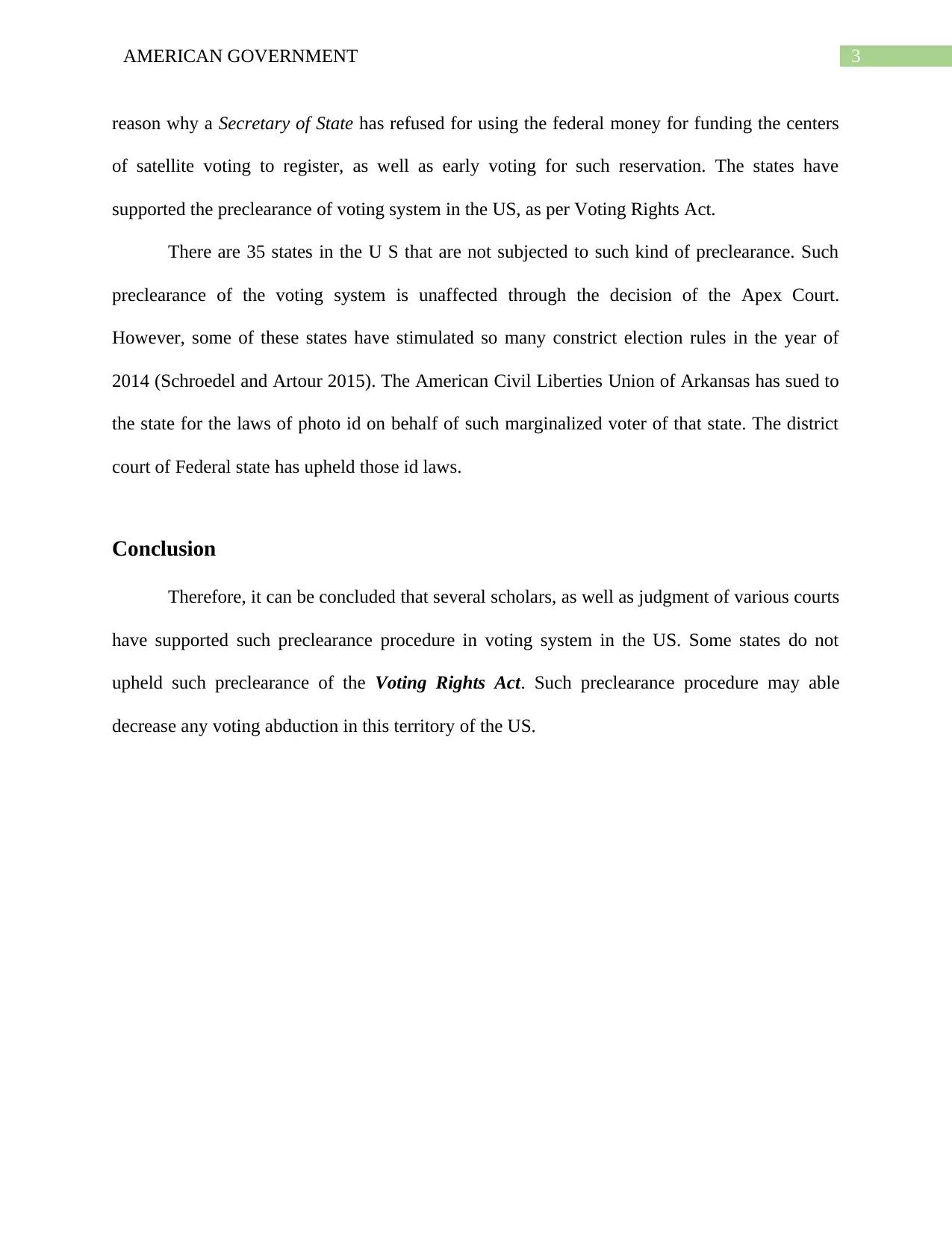
3AMERICAN GOVERNMENT
reason why a Secretary of State has refused for using the federal money for funding the centers
of satellite voting to register, as well as early voting for such reservation. The states have
supported the preclearance of voting system in the US, as per Voting Rights Act.
There are 35 states in the U S that are not subjected to such kind of preclearance. Such
preclearance of the voting system is unaffected through the decision of the Apex Court.
However, some of these states have stimulated so many constrict election rules in the year of
2014 (Schroedel and Artour 2015). The American Civil Liberties Union of Arkansas has sued to
the state for the laws of photo id on behalf of such marginalized voter of that state. The district
court of Federal state has upheld those id laws.
Conclusion
Therefore, it can be concluded that several scholars, as well as judgment of various courts
have supported such preclearance procedure in voting system in the US. Some states do not
upheld such preclearance of the Voting Rights Act. Such preclearance procedure may able
decrease any voting abduction in this territory of the US.
reason why a Secretary of State has refused for using the federal money for funding the centers
of satellite voting to register, as well as early voting for such reservation. The states have
supported the preclearance of voting system in the US, as per Voting Rights Act.
There are 35 states in the U S that are not subjected to such kind of preclearance. Such
preclearance of the voting system is unaffected through the decision of the Apex Court.
However, some of these states have stimulated so many constrict election rules in the year of
2014 (Schroedel and Artour 2015). The American Civil Liberties Union of Arkansas has sued to
the state for the laws of photo id on behalf of such marginalized voter of that state. The district
court of Federal state has upheld those id laws.
Conclusion
Therefore, it can be concluded that several scholars, as well as judgment of various courts
have supported such preclearance procedure in voting system in the US. Some states do not
upheld such preclearance of the Voting Rights Act. Such preclearance procedure may able
decrease any voting abduction in this territory of the US.
Paraphrase This Document
Need a fresh take? Get an instant paraphrase of this document with our AI Paraphraser
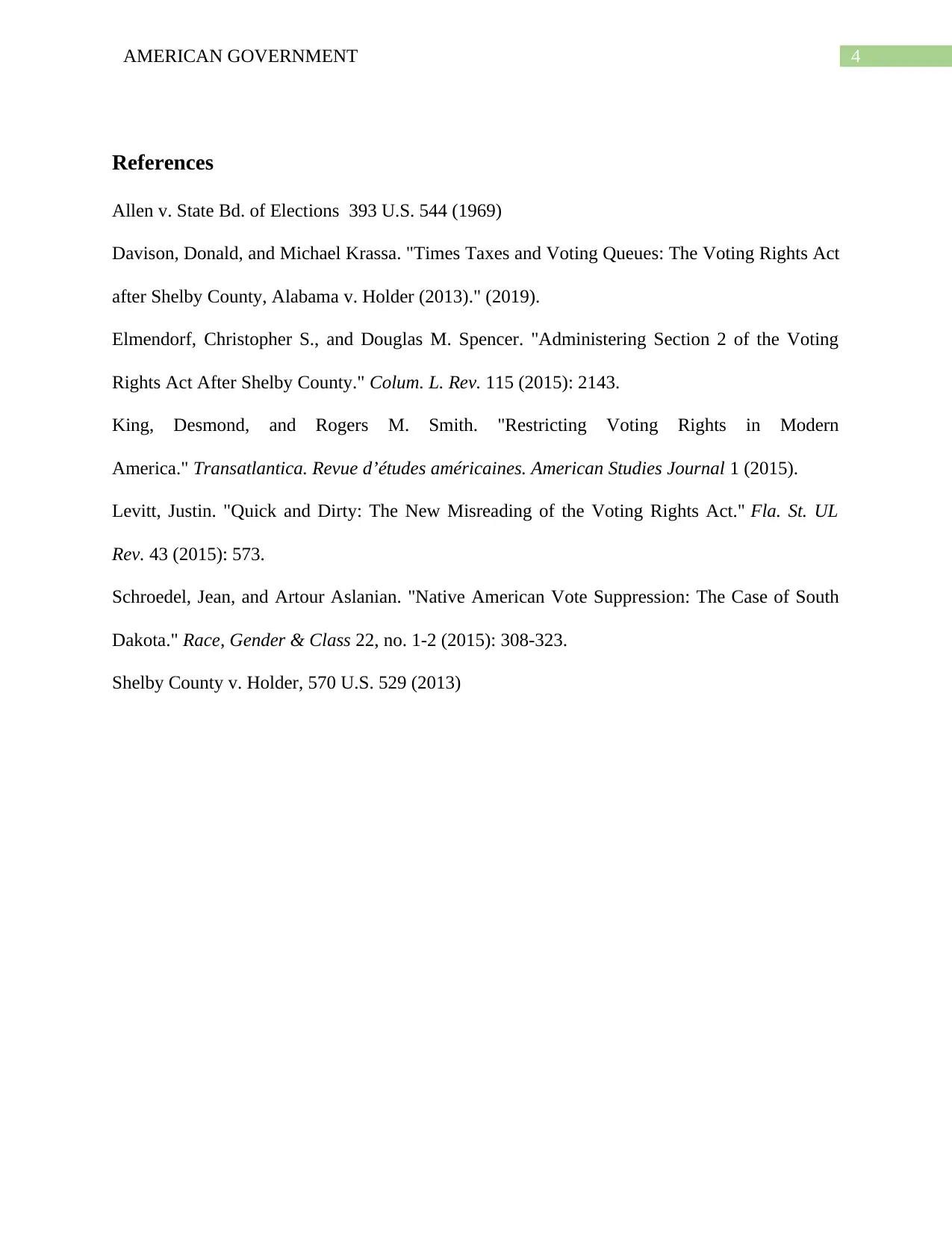
4AMERICAN GOVERNMENT
References
Allen v. State Bd. of Elections 393 U.S. 544 (1969)
Davison, Donald, and Michael Krassa. "Times Taxes and Voting Queues: The Voting Rights Act
after Shelby County, Alabama v. Holder (2013)." (2019).
Elmendorf, Christopher S., and Douglas M. Spencer. "Administering Section 2 of the Voting
Rights Act After Shelby County." Colum. L. Rev. 115 (2015): 2143.
King, Desmond, and Rogers M. Smith. "Restricting Voting Rights in Modern
America." Transatlantica. Revue d’études américaines. American Studies Journal 1 (2015).
Levitt, Justin. "Quick and Dirty: The New Misreading of the Voting Rights Act." Fla. St. UL
Rev. 43 (2015): 573.
Schroedel, Jean, and Artour Aslanian. "Native American Vote Suppression: The Case of South
Dakota." Race, Gender & Class 22, no. 1-2 (2015): 308-323.
Shelby County v. Holder, 570 U.S. 529 (2013)
References
Allen v. State Bd. of Elections 393 U.S. 544 (1969)
Davison, Donald, and Michael Krassa. "Times Taxes and Voting Queues: The Voting Rights Act
after Shelby County, Alabama v. Holder (2013)." (2019).
Elmendorf, Christopher S., and Douglas M. Spencer. "Administering Section 2 of the Voting
Rights Act After Shelby County." Colum. L. Rev. 115 (2015): 2143.
King, Desmond, and Rogers M. Smith. "Restricting Voting Rights in Modern
America." Transatlantica. Revue d’études américaines. American Studies Journal 1 (2015).
Levitt, Justin. "Quick and Dirty: The New Misreading of the Voting Rights Act." Fla. St. UL
Rev. 43 (2015): 573.
Schroedel, Jean, and Artour Aslanian. "Native American Vote Suppression: The Case of South
Dakota." Race, Gender & Class 22, no. 1-2 (2015): 308-323.
Shelby County v. Holder, 570 U.S. 529 (2013)
1 out of 5
Related Documents
Your All-in-One AI-Powered Toolkit for Academic Success.
+13062052269
info@desklib.com
Available 24*7 on WhatsApp / Email
![[object Object]](/_next/static/media/star-bottom.7253800d.svg)
Unlock your academic potential
Copyright © 2020–2025 A2Z Services. All Rights Reserved. Developed and managed by ZUCOL.





